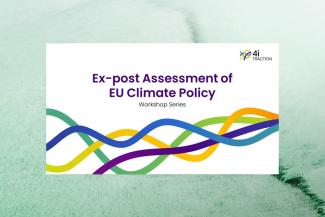
Invite-Only - Online
Workshop Serie on the Ex-post Assessment of EU Climate Policy
To complement and further discuss early results from the ex-post assessment of the 4i aspects of EU climate policy, a series of four workshops was held in April and May 2023.
As part of Work Package 2, the workshops facilitated dialogue between authors of the assessments and experts from each policy area. Each workshop was initiated by a presentation of the early results, which was followed by in-depth discussion of the most prominent policy issues and key transformative challenges that were identified. Input gathered from the discussions provided complementary insights and enabled a more profound understanding of the studied topics. Moreover, the workshops were a means of disseminating outputs to relevant stakeholders.
The first workshop on Investment works concerned the topic of investment challenges in EU climate policy. Findings from decomposition analysis and qualitative assessment were presented, which was followed by in-depth discussion of the most prominent issues and key transformative challenges that were identified. The discussion generated three main insights: that there is a lack of clarity on investment aspects in national decarbonisation strategies, that there is a need to strengthen the role of the financial sector beyond financial institutions’ own financial risk management, and that there is a need for need for better adjustment of public funding regarding technology readiness levels and the scale of investment projects.
The Infrastructure workshop took focused on infrastructure challenges in EU climate policy, in consideration of the fact that the development of adequate infrastructure is one of the key vectors of the transition to climate neutrality. Findings from decomposition analysis and qualitative assessment were presented and followed by a discussion of key infrastructural challenges and the extent to which they have been addressed by relevant EU policy, e.g., the Alternative Fuel Infrastructure Directive or the Ecodesign Directive. Discussion with experts from the field led to the following conclusions: that there is insufficient EU-level guidance on the development of climate-neutral infrastructure, that there is a need for a dedicated infrastructure strategy, and that green public procurement constitutes a key aspect of infrastructural development, yet one that has not received adequate attention thus far.
The third workshop concerned two dimensions of integration: the internal one, which relates to the interactions between investment, infrastructure, and innovation; and the external one, which concerns the integration of EU climate policy with other EU policies, as well as relations with countries outside of the EU. The presentation explored key aspects of both dimensions and, together with the discussion, revealed the following insights: transport policy is a distinctive policy area with regard to integration, one that is particularly sensitive to disagreement of actors external to the EU (e.g., with regard to extending the scope of the EU ETS to the aviation sector) and one where it is crucial to utilize multilateral avenues of communication; that there is a need to address integration more profoundly in long-term policy.
The Innovation workshop was held last and focused on challenges in the following aspects of innovation: technology, business models, and policy. Discussion with experts led to the following conclusions: that there are significant disparities between EU Member States with regard to policy implementation at national and regional level, and that pre-determinants of RES deployment based on countries’ access to fossil fuels play a substantial role in the Member States’ transition paths; that there has been inadequate business model innovation, particularly due to evolving market conditions resulting from, e.g., the progressive decentralisation of energy markets; and that literature on EU climate policy innovation tends to be dominated by topics revolving around the EU ETS, while insufficient attention is given to other policies.
The series of workshops provided valuable insights on the topics in focus and created an opportunity for highlighting not only the most prominent transformative challenges but also gaps in the literature on EU climate policy. It facilitated dialogue with experts from each field and acted as a means of disseminating findings to relevant stakeholders.